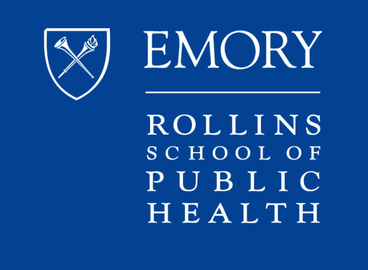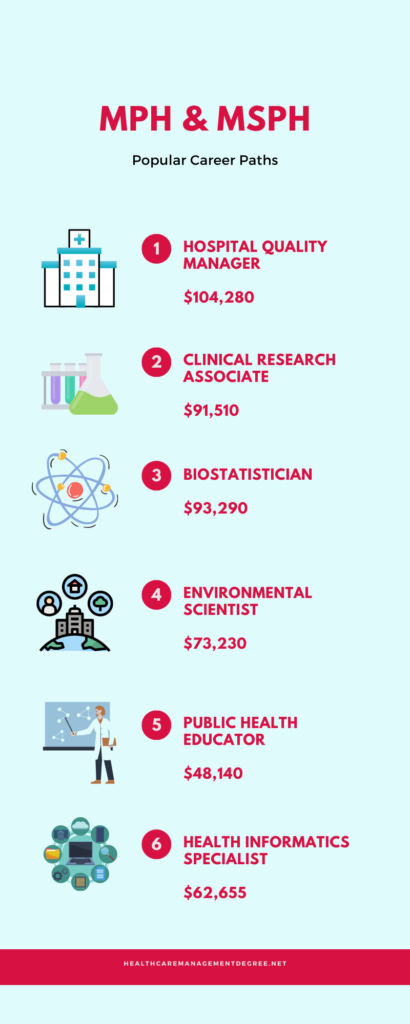Deciding whether to pursue a Master of Public Health or a Master of Science in Public Health degree depends mainly upon a candidate’s specific career focus. While both options will give you a solid foundation in the field of public health, there are a few differences to consider if you’re on the fence about which path to take.
Master of Public Health

Master of Public Health
The Master of Public Health is a professional master’s degree allowing students to gain competencies in broad-based areas of public health practice. Coursework can be completed in two to five years (depending on whether the student selects a full-time or part-time curriculum).
A bachelor’s degree is required before acceptance into a master’s program. Some of the more common areas of bachelor’s degrees prior to acceptance into an MPH program are education, biology, sociology, and business. Coursework for an MPH program has less focus on research, and the curriculum generally includes a study of the five essential areas of public health:
- Epidemiology
- Public Health Administration and Policy
- Biostatistics
- Environmental Health
- Behavioral/Social Science
MPH graduates have the skills and knowledge to solve public health problems by the ability to:
- Design public health studies
- Collect, analyze and interpret data
- Interpret and report the results of studies
MPH programs are designed for students who desire a relatively broad-based education in public health. Those graduating from an MPH program are prepared for careers in public policy, administration, education, or community practice as health scientists, lecturers, community health educators, and healthcare analysts. Students looking to practice hands-on in the field of public health might best be suited to this broader field of study.
An MPH program focuses on improving human health in populations to prevent illness and disease. Additional requirements for MPH programs include the completion of a field-based practicum and presentation of a capstone project. Typically, an MPH program will not require students to complete a research thesis or project.

Master of Science in Public Health
The Master of Science in Public Health (MSPH) degree is an academic, public health degree (rather than a professional public health degree) and is more research-oriented. The MSPH prepares graduates for careers in academia or research settings as educators, researchers, or publishers. Career goals might include:
- Examining existing standards in public health service.
- Correlating and incorporating data to generate new solutions to public health problems.
- Suggesting ways to improve public health services and their administration within the community.
Most MSPH programs take an average of two years to complete if you work a full-time program. For students who undertake the degree part-time due to other commitments, it can take longer. In most cases, students in an MSPH program will need to write and defend a research thesis to fulfill the degree requirements. Required MSPH coursework includes most of the same classes as are necessary for the MPH degree, but additional coursework may consist of:
- Research Methods
- Epidemiology of Infectious Diseases
- Chronic Disease Epidemiology
- Health Informatics
Graduates of MSPH programs are equipped with skills to:
- Use statistical methods to analyze and solve public health problems
- Apply public health ethical principles
- Demonstrate leadership in public health practice
A Master of Science in Public Health is an alternative to an MPH degree for those students who desire to learn more focused skills in a specific specialization within the public health field. They are also ideal for those who have no prior health-industry work experience but want to begin their career in public health. There is an intense focus on field experience and intensive coursework, which gives students the chance to use their training in real-world situations.
Specializations and Concentrations Within MPH and MSPH Programs
Many students want to focus on a specific career path when working on their graduate degree in public health. There are numerous specializations within the field, and not all are unique to one degree program or the other. This is why you will want to do your research when choosing the best school for you. Checking each school’s website carefully can help you decide when it comes time to begin submitting applications.
While a complete list of concentrations and specializations among schools would be too exhaustive to list in this article, here are a few examples:
Emory University Rollins School of Public Health

At Emory University, students can earn an MPH in the following areas:
- Behavioral, Social, and Health Education Sciences
- Biostatistics
- Environmental Health
- Environmental Health and Epidemiology
- Global Environmental Health
- Epidemiology
- Global Epidemiology
- Health Policy
- Health Care Management
- Global Health
Students at Emory who wish to pursue an MSPH will receive an academic background in one of four fields:
- Epidemiology
- Global Epidemiology
- Biostatistics
- Health Policy and Health Services Research
See also: Health Care Management Degree Programs at Emory University
Boston University

At Boston University, students pursuing an MPH can specialize in these areas:
- Community Assessment, Program Design, Implementation, and Evaluation
- Environmental Health
- Epidemiology and Biostatistics
- Global Health Program Design, Monitoring, and Evaluation
- Health Communication and Promotion
- Health Policy and Law
- Healthcare Management
- Program Management
- Chronic and Non-Communicable Diseases
- Global Health
- Human Rights and Social Justice
- Infectious Disease
- Maternal and Child Health
- Mental Health and Substance Use
- Pharmaceutical Development, Delivery, and Access
- Sex, Sexuality, and Gender
BU students who want to pursue an MSPH will pursue an MS in population health research in one of these categories:
- Applied Biostatistics
- Climate and Health
- Epidemiology
- Global Health
- Translation and Implementation Science
As you can see, concentrations and specializations vary widely between schools. If your goal is to pursue a career in a specific area of public health, it’s worth putting in some extensive research to find a program that meets your particular needs.
You might also like: Top 50 Masters in Public Health (MPH) Online
Frequently Asked Questions About MPH and MSPH Programs

Featured Programs
Do Course Requirements Vary Between Schools?
Yes. Depending on the school you attend for your MPH or MSPH, the course requirements can differ. This is why it’s essential to research the best public health degree programs before committing to a specific university or college.
Can I Transfer MPH or MSPH Program Credits From One Institution to Another?
Again, this depends on the institution. For example, the University of Buffalo accepts up to 10 credits, while John Hopkins Bloomberg School of Public Health will not accept any. If you plan on switching schools midway through your program, you will want to research your options carefully to make sure it is permitted.
What Is the Delivery Format for MPH and MSPH Programs?
The Council on Education for Public Health is responsible for accrediting both MSPH and MPH programs. MPH and MSPH programs are offered both on-campus and online. However, there are significantly more CEPH-accredited MPH programs online than there are online MSPH programs. If you are trying to decide which degree to pursue and you want to attend an online program, this may influence your decision.
Are Both Degrees Equally Respected?
In terms of respect and recognition in the field of public health, A Master of Science in Public Health and a Master of Public Health are equivalent.
What is an MSc Degree?
In the UK and parts of Europe, an MS degree is referred to as an MSc degree. Internationally, degree titles can vary significantly, depending on where you live. Generally speaking, an MSc degree is a postgraduate degree that students can obtain after a bachelor’s degree but before a higher degree like a PhD.
How Long Does It Take to Complete an MPH vs. an MSPH?
Most MSPH and MPH programs require approximately 45 credit hours and take around two years to complete for full-time students. Some schools may offer accelerated programs that can be completed in less than two years. For part-time students who are juggling other responsibilities, programs will obviously take longer to complete.
The completion time varies between institutions. For example, some courses might only be offered once a year. Therefore, if you decide not to take a specific course one semester, you will have to go back and make it up the following year. Ultimately, the amount of effort you put into the program will determine when you graduate.
Can a Student Switch From an MPH to an MSPH Program?
Generally speaking, students who want to switch from a Masters in Public Health program to a Master of Science in Public Health program will need permission from the school they are attending. You will want to check the guidelines and requirements for your particular school to find out the exact protocol for switching your program.
What Are the Admissions Requirements?
The admission requirements vary depending on the university or college that offers the program. Typically, you will first need to complete an undergraduate degree program in public health or a related field. As with all master’s programs, you will need to submit proper documentation such as your entrance exam scores (GRE or MCAT) and your official transcript.
Certain schools may prefer to admit students into their MPH programs if they already have some full-time work experience in the public health field. And with some MSPH programs, schools are looking for applicants who can demonstrate good research and analysis skills. Since different schools can have additional requirements and processes, you will need to check the specific guidelines for each institution when you start your application process.
What Are the Career Paths for Those Undertaking an MPH Program vs. an MSPH Program?
Because of the similarities between these two degree programs, the career paths open to students tend to overlap. Those with an MSPH degree are more likely to pursue an academic career and look for health education, science, lecturing, or research opportunities.
Students who complete an MPH program tend to work in government agencies, non-profits, administration, and community practice. Below are some examples of careers for students who graduate with an MPH or MSPH degree.

Hospital Quality Manager
$104,280 per year
Also called Medical Managers or Health Service Managers, these professionals coordinate, plan, and direct the business side of healthcare facilities. They may oversee an entire institution or just one department, and they work closely with all other workers in the facility. Titles for this job can vary widely and will depend on the organization itself.
Clinical Research Associate
$91,510 per year
Also called a Medical Scientist, Clinical Research Associates work on relevant medical research and clinical trials. They may develop programs to improve public health, help to standardize pharmaceuticals, create new medical devices and procedures, and much more.
Biostatistician
$93,290 per year
Biostatisticians use data, mathematics, and statistics to identify public health trends and causes of disease. Through their research and analysis, they can help determine which populations are affected by illness. In turn, this allows other public health professionals to make decisions on treatment and prevention.
Environmental Scientist
$73,230 per year
Public health and environmental health often go hand in hand. As an environmental scientist, you play a role in how the environment influences people’s health. You may work on projects in waste management, pollution control, recycling, soil contamination, and other things that directly affect the health of the public.
Public Health Educator
$48,140 per year
Public Health Educators inform and instruct people about healthy behaviors and strategies to improve overall health. They serve as links between their communities and other public health professionals, developing and implementing strategies to reduce injury and illness within a population. Although the pay for public health educators is relatively low, this rewarding position is ideal for those who have a passion for public health and teaching.
Public Health Informatics Specialist
$62,655 per year
Health informatics is a new field that merges healthcare and technology. As a public health informatics specialist, you will use complex software systems to retrieve and store information about public health. Communication is also vital in this role since you will likely need to relay this information to others concerned with protecting public health.
Final Thoughts on an MPH vs. MSPH—Which One Is Better?
Students with either a Master of Science in Public Health or a Master of Public Health can do a great deal of good in the world, regardless of which path they choose. Most graduates of public health programs will find meaningful and stable employment in both the private and public sectors.
When it comes down to specifics, an MPH is more of a professional practitioner degree for those who want to work on specific public health issues. At the same time, an MSPH is a more academic degree focusing on the big picture of public health. However, both groups of students will be suited to work in many medical, educational, non-profit, technology, research, and government settings. Because of this, one is no better than the other, and graduates of either degree will likely help to improve the well-being, safety, and health of their communities.
Related: